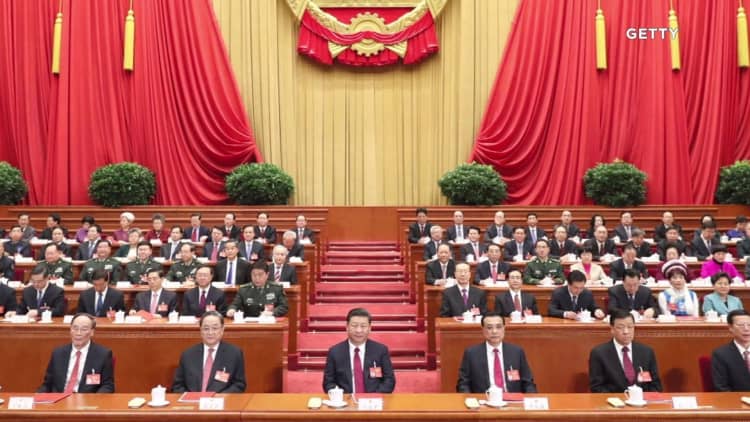President Xi Jinping's trusted ally Li Zhanshu stands a good chance of becoming chairman of China's parliament while Communist Party organisation chief Zhao Leji is likely to head its corruption watchdog, sources have told the South China Morning Post.
Li is widely expected to be elevated to the Politburo Standing Committee – the ruling party's top echelon of power – on Wednesday, a day after the party's 19th national congress closes in Beijing. Most observers had predicted he would succeed Wang Qishan as anti-corruption tsar.
But two well-placed sources told the Post that Li would, instead, most likely head the National People's Congress (NPC) – theoretically the highest organ of state power in China – when current chairman Zhang Dejiang retires in March. Whether Li would also take over the Hong Kong and Macau affairs portfolio currently overseen by Zhang is not clear.
"Li Zhanshu will succeed Zhang Dejiang," a source familiar with the situation said, adding that Zhao would also be promoted into the Politburo Standing Committee and was likely to succeed Wang Qishan in leading anti-corruption work. The moves were confirmed separately by another source.
While they may come as a surprise to some, they reflect Xi's new policy direction for the next five years laid out in his maiden party congress speech on the opening day of the congress. The president stressed the need to tighten supervision of party members and institutionalise anti-corruption work. He also highlighted the need to improve "law-based governance" by improving "the Chinese socialist system of laws" – meaning the institutionalisation of the party's power through legislation.

To achieve those goals, Xi plans to set up a central leading group "to exercise leadership over the [anti-graft] initiative". He also plans to introduce a national supervision law and set up a national supervisory commission.
All those plans would heavily involve the NPC and the party's graft watchdog, the Central Commission for Discipline Inspection (CCDI).
Having Li – director of the party Central Committee's General Office and effectively Xi's chief of staff – head the NPC would smooth the work, political analysts said.
Steve Tsang, director of the SOAS China Institute at the University of London, said Li becoming China's top legislator would ensure "strong support for Xi" from the NPC in the next five years.
"The NPC may not be a key pillar of power in the sense of the British House of Commons or the US Congress, but having it under a trusted subordinate means Xi is putting himself in a strong position to make [legislative] changes," he said.
Tsang said Li had proved in the past that he could effectively carry out Xi's instructions.
More from the South China Morning Post:
Xi warns party to tackle challenges as China moves into new 'modern socialist' era
Xi launches new era with vision in which Hong Kong has part to play China has the world's biggest military. Now Xi wants it to be the best
Chen Daoyin, a political scientist at Shanghai University of Political Science and Law, said Li's connection with Xi could also strengthen the power of the NPC.
"Thanks to Xi's backing, Li could turn this role into something much more than a rubber stamp if he is made the NPC chairman," Chen said, adding that Li, 67, could be elevated to No 3 in the party hierarchy after his ascension.
Li was one of the key officials who accompanied Xi to Hong Kong in July for celebrations marking the 20th anniversary of its return to Chinese sovereignty. Professor Lau Siu-kai, vice-chairman of the Chinese Association of Hong Kong and Macau Studies, said Xi had clearly spelled out political directions for Hong Kong during that visit.
"Whoever takes over from Zhang Dejiang will only be an implementer," he said. "I believe Xi will continue to watch over Hong Kong affairs. But given the strong ties between Xi and Li, if Li takes charge of Hong Kong affairs, he will understand the president's thinking better [than others]."
Promoting party personnel chief Zhao, at the relatively young age of 60, into the Politburo Standing Committee to lead the anti-graft effort would enable Xi to ensure the continuity of his anti-corruption campaign and speed up the institutionalisation of party supervision, a source said.
"Given Zhao's age, he could end up serving two terms on the Politburo Standing Committee," he said. "His role in the party will rise. This will help to establish continuity and to deepen the anti-corruption work. His experience as the party's organisation chief will be valuable for the new job."
The source said that as the new head of the CCDI, Zhao stood a good chance of being named head of the new national supervisory commission that is expected to be established early next year.
Both Chen and Tsang agreed with that assessment and said they expected Zhao would lead the powerful new commission.
Chen said Zhao could wield huge political power if he became the head of both the CCDI and the national supervisory commission.
Tsang was more cautious and said Zhao still needed to prove himself to Xi.
"Five years is an eternity in politics," Tsang said, "I doubt that Xi has already decided if Zhao will serve one term or two as head of disciplinary affairs. He will be judged on how well he can maintain party discipline and rally the rest of the party to support Xi."

